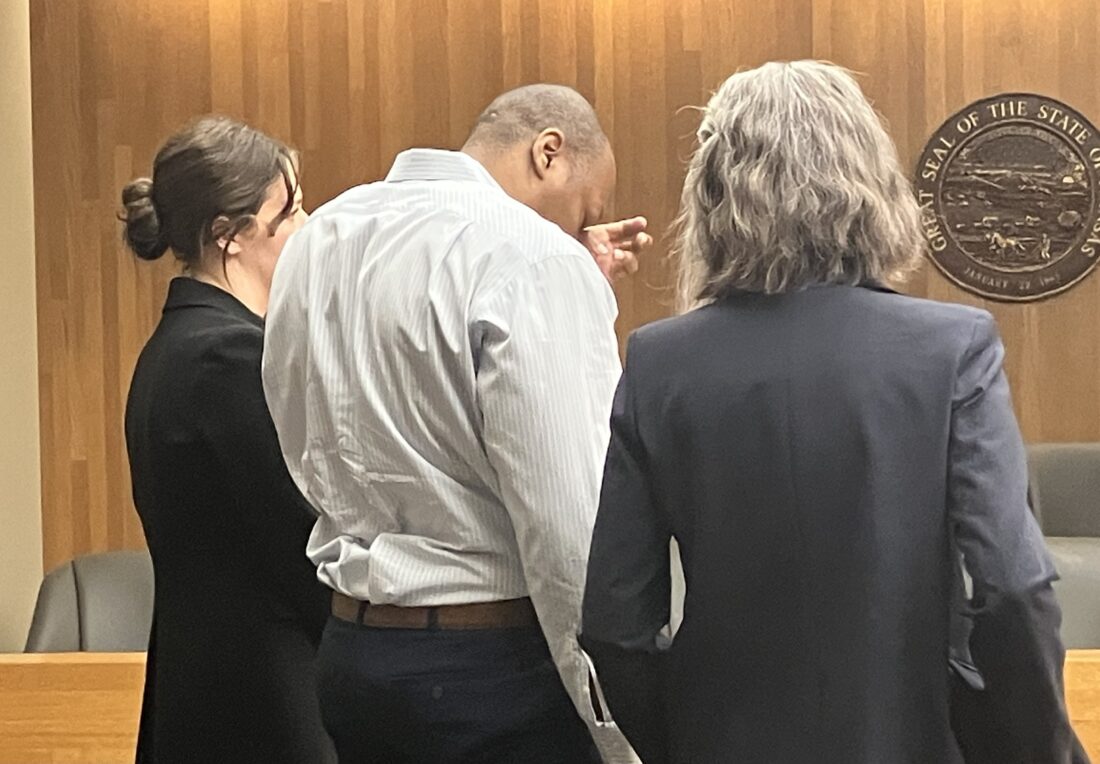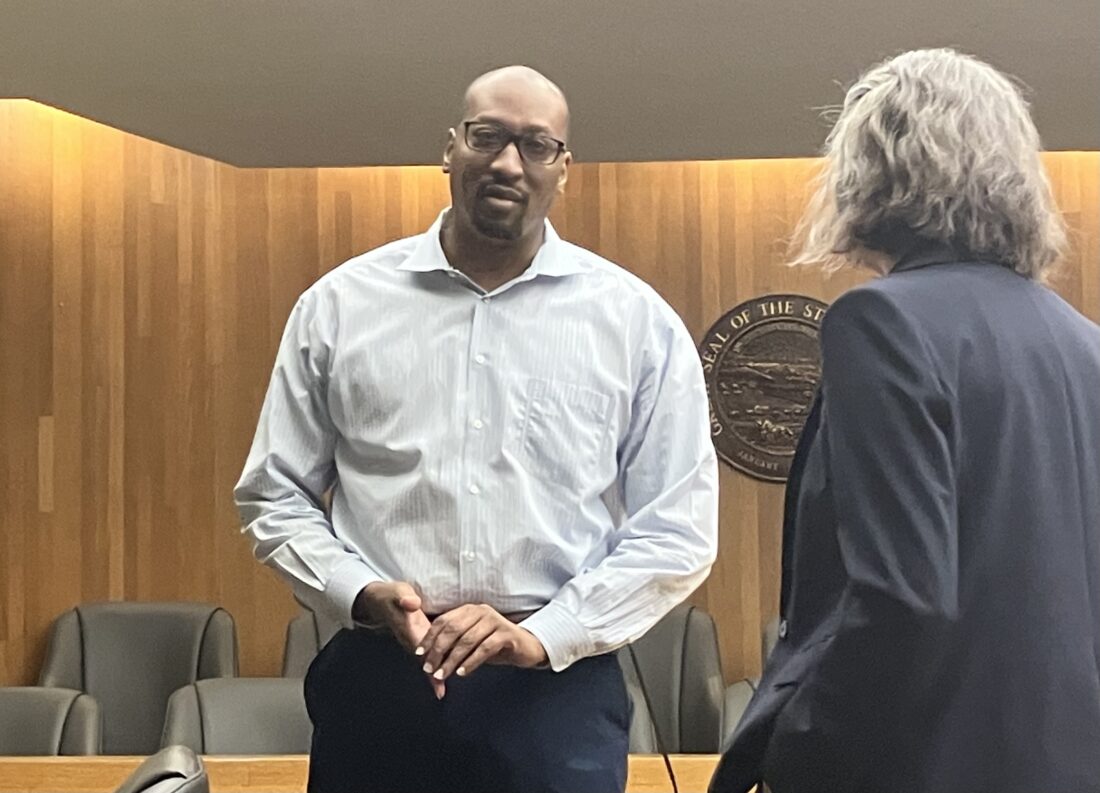Jury finds man not guilty on all 3 counts in teen drug death case
Public defender makes last-minute suggestion that defendant was targeted because he's a 'big, scary Black man'

photo by: Kim Callahan/Journal-World
Benjamin Mims hugs his attorney, Jessica Glendening, while his other attorney, Allyson Monson, looks on after Mims' acquittal in a drug death case, Thursday, July 10. 2025.
Updated at 4:24 p.m. Thursday, July 10, 2025
A 37-year-old defendant sobbed as three successive “not guilty” verdicts were read Thursday in Douglas County District Court, acquitting him in a Lawrence teenager’s 2021 fentanyl overdose death.
Benjamin Mims wiped away tears and hugged his attorneys as the mother of the deceased teen, who had been sitting in the front row throughout the trial, quietly left the courtroom.
As Mims exited into the hallway outside Judge Amy Hanley’s courtroom, a chorus of cheers arose from his supporters. One supporter had yelled “God bless you all” to the jurors as they filed out.
Mims was charged with distributing a controlled substance causing the death of 18-year-old Mohamadi Tompson Issa Jr.; conspiracy to unlawfully distribute fentanyl; and unlawful distribution. The jury took about four hours to decide that the state had not met its burden of proof beyond a reasonable doubt on any of the counts.
Just before the jurors retired to deliberate, they heard about an hour and a half of closing arguments, during which Mims’ public defender, Jessica Glendening, suggested to jurors that Mims had been targeted by law enforcement because he’s a “big, scary Black man.”

photo by: Kim Callahan/Journal-World
Benjamin Mims wipes away tears after being acquitted Thursday, July 10, 2025, in Douglas County District Court. His attorneys, Jessica Glendening, right, and Allyson Monson are pictured beside him.
The remark drew a sharp rebuttal from Douglas County Deputy District Attorney David Greenwald, who objected to the statement, which was made during the final minute of Glendening’s closing argument and which was not, he said, supported by any evidence in the case.
Greenwald, in his rebuttal, took to the floor and explosively emphasized to the jury that the case was “not about race!” No witnesses during the trial had suggested Mims was targeted because he is Black, Greenwald said, noting to jurors that Glendening’s opinions were not evidence.
The jury of six men and six women appeared to include at least three people of color.
Issa died of an overdose, according to his autopsy report, at his family’s Lawrence home on Aug. 28, 2021. The state contended that Mims sold the drugs to Logan Hastie Morgan, who then sold them to Issa — a chain of action that Greenwald sought to prove through a series of corroborating texts and phone calls, including messages where Morgan told others that “My dude wants me to franchise,” which Morgan said meant that Mims, his dealer, wanted him to sell 100 to 200 pills a week.
Morgan, who received a favorable plea deal in exchange for testifying against Mims, was a principal witness in the case, both during Mims’ preliminary hearing and in his trial this week. In the latter, Morgan invoked his Fifth Amendment right against self-incrimination, but much of his testimony from the earlier hearing was read into the trial record.
Glendening’s account was that police prematurely zeroed in on Mims based on Morgan’s unreliable information — he admitted he had “holes” in his brain and memory problems from heavy drug use — and failed to explore other investigative avenues, including actively ignoring evidence “they didn’t like.”
“Things aren’t always what they seem,” she said, reprising a theme from her co-counsel’s opening statement. “When you look closer, the whole thing falls apart.”
Specifically, she said that the state had only proved that Issa died with fentanyl in his system, but that where “that exact fentanyl” came from was a mystery — given that Morgan had about half a dozen dealers — and that the only thing linking her client to the drug enterprise of Morgan was Morgan’s say-so.
No drugs were tested in the case, she said, including a bluish-green pill that was found on Issa’s body. And a video that former Lawrence Police Detective Charles Cottengim believed showed a meeting between Mims and Morgan in downtown Lawrence near the time of Issa’s death was not produced at the trial.
“We shouldn’t convict people based on vibes,” Glendening told jurors, “but that is what this case is.”
The police, she said, accepted what Morgan told them because it was what they wanted to hear, and Morgan benefited greatly from the telling.
“Almost 17 years is serious incentive to point the finger at someone else,” she said of Morgan, who had originally faced a potential 20 years in prison instead of the three and a half he received via his plea deal to testify against Mims.
Glendening faulted Cottengim for investigating Issa’s death as a drug case and not as a homicide case. She said Cottengim’s desire to pin a crime on Mims, whom he saw as the “big fish” in a drug-dealing food chain, resulted in a “backwards” investigation.
Greenwald told jurors that, in addition to Morgan’s testimony, an array of text messages and phone calls around the time of Issa’s death, as well as testimony from law enforcement, led straight to Mims — an argument that the jury evidently rejected.
As the Journal-World has reported, Mims earlier pleaded guilty to voluntary manslaughter in Issa’s death, but he was allowed to withdraw that plea due to a misunderstanding of how much time he would face in prison. His attorney during that plea deal was Douglas County’s current district attorney, Dakota Loomis.
Mims was on federal parole at the time of Issa’s overdose. He was convicted in 2019 in federal court of felony possession with the intent to distribute heroin and was also convicted in 2009 for felony possession of narcotics in Douglas County. He also has multiple felony convictions for aggravated robbery, theft and burglary.

photo by: Kim Callahan/Journal-World
Benjamin Mims exits the courtroom where he was acquitted on Thursday, July 10, 2025. His attorney, Jessica Glendening, is at right.







